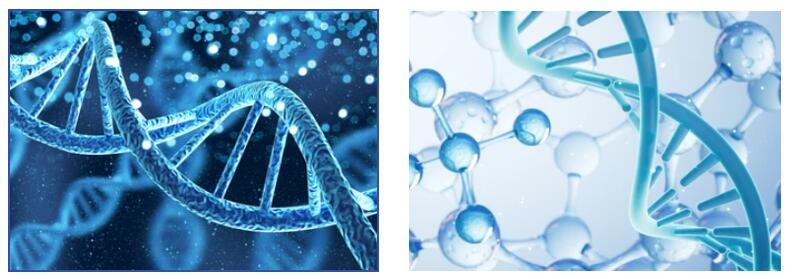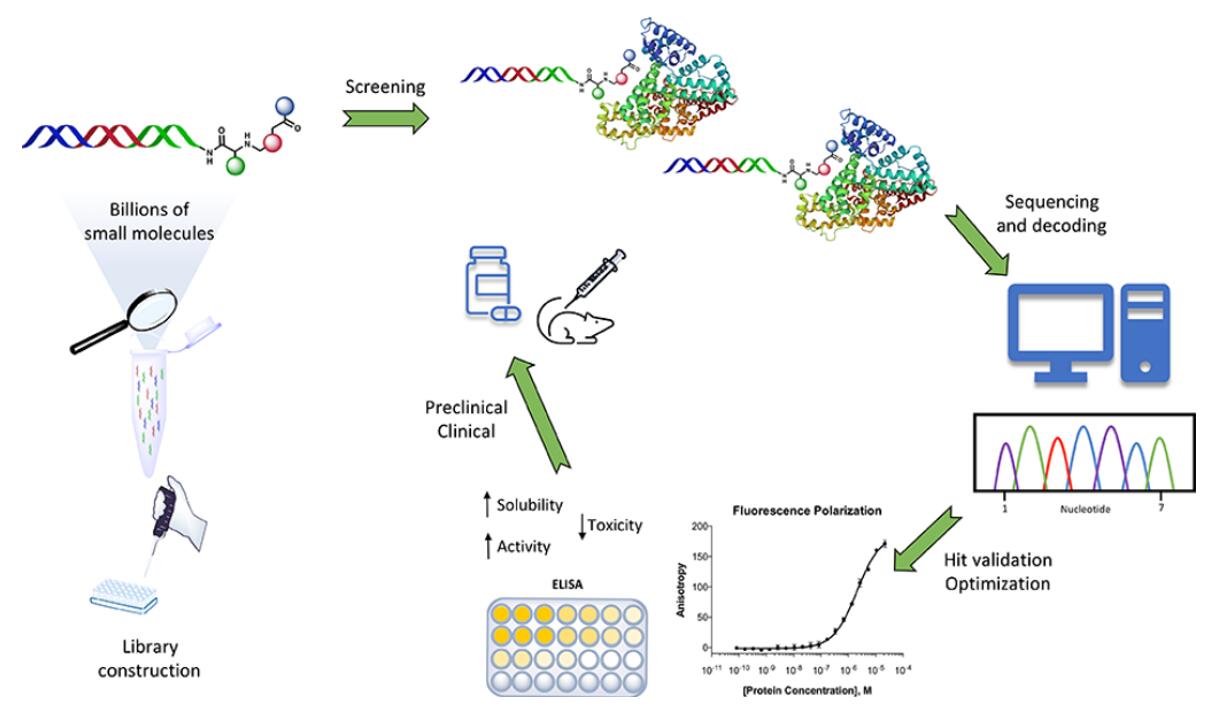DNA-encoded libraries (DELs) Technology refers to a versatile and powerful technology platform that can be used to screen chemical libraries of unprecedented size at moderate costs by DELs. As one of the most cutting-edge technologies in the current field of new drug discovery, it combines combinatorial chemistry and molecular biology and has been greatly promoted by the rapid development of high-throughput sequencing technology.
DELs are a collection of chimeric compounds that consist of many structurally diverse chemical building blocks (BBs) and single-stranded (ss) or double-stranded (ds) DNA. DELs have unique information about the identity and the structure of each library member due to distinctive DNA tags coupled to small molecules. DNA tags uniquely encode the identity of diverse small molecules and act as amplifiable identification barcodes, allowing the identification and relative quantification of single molecules in complex mixtures.
With the advancement of DNA-compatible reactions, selection methodologies, next-generation sequencing, and data analysis, DELs technology is increasingly used in the discovery of a large number of bioactive molecules with drug-like properties, helping to discover more clinical candidates [1], [2], [3].

DELs Technology Process
The DELs technology process for drug discovery basically involves DELs construction, affinity-based screening, sequencing and decoding, and Hit validation. Hits with novel structure and potential druggability discovered by DELs can be further optimized for preclinical or clinical testing.
a. DELs construction
DELs construction starts with an oligonucleotide containing a chemical linker moiety and assembles DNA barcodes and synthetic building blocks (BBs) through iterative cycles.
b. Affinity-based screening
After incubation of DELs with the target protein, large-scale affinity-based screening against a target of interest is performed using a typical "bind-wash-elute" procedure.
c. Sequencing and decoding
DNA tags for high-affinity target binders are amplified by PCR, and the compound information is decoded after high-throughput sequencing.
d. Hit validation
Off-DNA compounds or On-DNA compounds are re-synthesized and their activity against target proteins is evaluated through a functional assay.
 Fig. 1 Basic process of DELs technology [3].
Fig. 1 Basic process of DELs technology [3].
Our Platform
Based on structurally diverse molecular building blocks (BBs) and years of chemical expertise, Alfa Chemistry has established a versatile and powerful DELs technology platform for discovering small molecule ligands for biologically and pharmaceutically relevant targets.
- Our DELs technology platform integrates DELs design, synthesis, screening, data analysis and validation, providing a strong technical foundation for the discovery of new target-active small molecules.
- Our DELs technology platform combines DELs screening with drug development technologies such as computer-aided drug design (CADD) to help accelerate the development of small molecule drugs.
- Our DELs technology platform has a complete DELs synthesis toolbox, containing hundreds of DNA-compatible reactions explored by the research team, which greatly expand the DELs chemical space and retain the novelty of DELs.
- Our DELs technology platform has the ability to design and synthesize various types of DELs, including macrocyclic DELs, peptide DELs, natural products enriched DELs, glycol DELs, target-specific DELs, covalent DELs, and other types of DELs to help customers conduct hundreds and thousands of screening experiments, accelerating the discovery of hits from a selection of compounds.
Besides offering a wide selection of DELs containing hundreds of millions of compounds, Alfa Chemistry also offers custom services for DELs. We can synthesize DELs of high quality standards according to customer requirements, provide DELs screening services for targets, and analyze and optimize discovered Hits, thereby accelerating drug discovery. If you need DELs services, please feel free to contact us.
References
- Franzini, R. M.; et al. DNA-Encoded Chemical Libraries: Advancing beyond conventional small-molecule libraries. Acc. Chem. Res. 2014, 47(4): 1247–1255.
- Zimmermann, G.; Neri, D. DNA-encoded chemical libraries: foundations and applications in lead discovery. Drug Discov Today. 2016, 21(11): 1828–1834.
- Adrián G-M.; et al. DNA-Encoded Chemical Libraries: A comprehensive review with succesful stories and future challenges. ACS Pharmacol Transl Sci. 2021, 4(4): 1265–1279.
